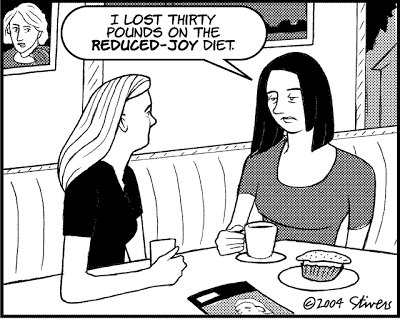Lose Weight > Common Sense To Lose Weight > Common Sense Article > Long-Term Weight Loss Extremely Hard For Post-Menopausal Women
Long-Term Weight Loss Extremely Hard For Post-Menopausal Women
Several studies have looked at postmenopausal body weight control and diets. A team of researchers from the University of Illinois said that postmenopausal dieting women should eat plenty of protein so that they do not lose too much muscle. Another study warned that high-protein diets may encourage bone density loss in postmenopausal women.
Even for younger females and men of all ages, dropping the pounds initially during a diet is usually achievable, but keeping the weight off over the long term is challenging. For postmenopausal women, the authors say, it is much harder.
Postmenopausal women are at a higher risk of developing certain diseases and conditions - those who are overweight have an even higher risk. Overweight postmenopausal women who manage to lose weight, have much better health outcomes. A study carried out by researchers from the Prevention Center at the Fred Hutchinson Cancer Research Center in Seattle, Washington, found that those who lost at least 5% of their bodyweight had noticeable reductions in markers of inflammation.
The researchers found that behaviors which are linked to weight loss initially during a diet and exercise drive, just simply do not work after a while for post-menopausal females. They believe that interventions which target these behaviors could help older women achieve positive long-term outcomes, especially obese women.
Lead researcher Bethany Barone Gibbs, PhD, explained that several factors make weight loss much harder for post-menopausal women:
"Not only does motivation decrease after you start losing weight, there are physiological changes, including a decreased resting metabolic rate. Appetite-related hormones increase. Researchers studying the brain are now finding that you have enhanced rewards and increased motivation to eat when you've lost weight."
If you add them all up, greater appetite, a lower resting metabolic rate, etc., it is very difficult for post-menopausal women to lose weight and to keep it off.
Traditionally, treatments, particularly behavioral ones for obesity, have over-concentrated on keeping the calories down - an approach which may sound good in theory, but has very disappointing long-term results. Dr. Gibbs and team set out to find out what impact certain alterations in eating behaviors and selected foods might have on weight loss after six and 48 months. They focused just on post-menopausal women who were overweight.
508 women took part in their study. They were randomly placed into two groups:
- A Health Education Group - they were offered seminars on women's overall health. The seminars included no specific details on weight loss.
- A Lifestyle Change Group. - the participants had several meetings with psychologists, exercise physiologists and nutritionists. They were encouraged to reduce their fat intake, while at the same time increase their consumption of whole grains, fruit and vegetables. They were also encouraged to do moderate exercise regularly.
Those who weighed less at four years ate fewer desserts and consumed fewer sugary drinks.
Less meat, cheese, more fruit and vegetables - these were additional important predictors of long-term weight loss.
At 48 months all the participants were eating out less, even the ones who lost no weight. The authors believe this may be due to the country's economic downturn - when an economy is in trouble, people eat out less.
Planning to eat fewer fried foods may not last very long, the authors explained.
Dr. Gibbs said:
"People are so motivated when they start a weight loss program. You can say, 'I'm never going to eat another piece of pie,' and you see the pounds coming off. Eating fruits and vegetables may not make as big a difference in your caloric intake. But that small change can build up and give you a better long-term result, because it's not as hard to do as giving up French fries forever."
Eating fewer desserts and sugar-sweetened drinks is closely linked to successful short- and long-term weight loss/maintenance. However, consuming more fruits and vegetables and less meat and cheese are additional contributors to successful long-term body weight control, the authors wrote.
Dr. Gibbs wrote:
"If the goal is to reduce the burden of obesity, the focus must be on long-term strategies because changes in eating behaviors only associated with short-term weight loss are likely to be ineffective and unsustainable."
What is post-menopause?
Post-menopause is the period in a woman's life after the menopause. Many of her undesirable symptoms that she might have experienced when she was younger or during the menopause gradually go away. However, several factors, including lower levels of estrogen, mean that her risks of developing some health conditions and diseases increase, including heart disease, becoming overweight, diabetes type 2, some cancers, and osteoporosis. Breast cancer risk is even greater for postmenopausal women if they gain weight.A woman is menopausal when she has not had a period for 12 months. A blood test for FDH (follicle stimulating hormone) is also another way of determining whether a woman is postmenopausal. After the ovaries start shutting down, blood FSH levels shoot up.
The average age a woman goes through the menopause is 51; some may go through it earlier or later.
The word "menopause" comes from the Greek men (gen. menos) meaning "month", and pausis meaning "a cessation, a pause". Together the prefix and suffix literally mean "the cessation of the monthly" (monthly periods).
Written by Christian Nordqvist
Related Articles
-
10 Easy Ways to Cut Calories in Your Diet (Without Going Hungry)
Whether youre trying to lose weight or just keep from gaining weight,
-
Healthy And Quick Weight Loss - Healthy Diets That Work
If people want to lose weight quickly, it is best to stick with natura
-
Weight Loss Surgery A Last Resort
Thinking about weight loss surgery? Youre not alone. Over two-thirds o
-
Herbal Phen-fen Like Weight Loss Products
In the wake of the ban against phen-fen and Redux, many weight-loss cl
-
How To Start Your Weight Loss Diet Plan
In this day and age, many people live very unhealthy lives. And to tha
-
Weight Loss Exercise Comes in Many Forms
Every time one turns on the television or browses the internet, th
- DON'T MISS
- Can I Combine Different Types Of Natural Weight Loss Pills For Effective Fat Loss?
- 7 Ways to Eat Out and Still Lose Weight
- Straightforward Guidance And Tips For Coping With Hemorrhoids
- Idiot Proof Diet-Weight Loss-online Diet Generator-Diet Hand Book-Dieting Tricks
- How Can You Lose Belly Fat Fast?
- Weight Loss – The Structure of Online Diet Plans Influences Dieting Success
- A Behavioral Approach to Losing Weight
- 6 Ways In Which You Can Lose Weight
- Why You Can’t Shed 10 Pounds In 2 Days
- Weight Loss Hypnosis Remedies




